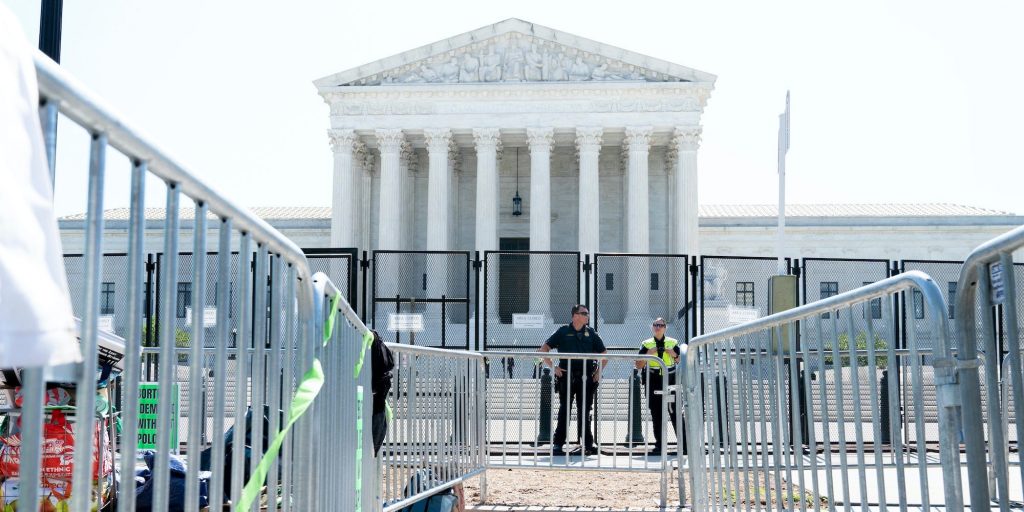- A Trump campaign lawyer said SCOTUS might take up an election case because of possible unrest on January 6.
- The lawyer, Kenneth Chesebro, emailed John Eastman about the possibility, per The New York Times.
- Chesebro wrote that the odds would be "favorable if the justices start to fear that there will be 'wild' chaos."
A Trump campaign lawyer wrote in emails in late 2020 that the possibility of "wild chaos" on January 6, 2021, could pressure the Supreme Court to take up a case that could overturn the presidential election, The New York Times reported Thursday.
In a December 24, 2020 email exchange between the Trump attorney, Kenneth Chesebro, and conservative lawyer John Eastman, the two discussed the possibility of the Trump campaign getting a last-minute lawsuit challenging the election results in Wisconsin before the Supreme Court.
Eastman also claimed to have inside knowledge of "a heated fight underway" between the justices over election cases.
"For those willing to do their duty, we should help them by giving them a Wisconsin cert petition to add into the mix," Eastman wrote, according to The Times.
Chesebro replied that the Wisconsin case "gives more ammo to the justices fighting for the court to intervene" — and referenced possible unrest on January 6.
"I think the odds of action before Jan. 6 will become more favorable if the justices start to fear that there will be 'wild' chaos on Jan. 6 unless they rule by then, either way," he wrote, according to The Times.
"Though that factor could go against us on the merits," he added. "Easiest way to quell chaos would be to rule against us — our side would accept that result as legitimate."
Chesebro referenced the possibility of "'wild' chaos" influencing the court on January 6 five days after Trump announced a "Big protest in D.C. on January 6th" on Twitter on December 19, telling his supporters, "Be there, will be wild!"
"You miss 100 percent of the shots you don't take," Chesebro mused in the email, according to The Times. "A campaign that believes it really won the election would file a petition as long as it's plausible and the resource constraints aren't too great."
It is unclear how Eastman would have known about such internal Supreme Court deliberations, or what case or petition the justices would be engaged in a "heated" debate over.
The Supreme Court shot down a hail-mary lawsuit seeking to overturn the 2020 election results in four states that voted for President Joe Biden with no noted dissents on December 11.
The original jurisdiction lawsuit, brought by Texas Attorney General Ken Paxton and supported by Trump, aimed to invalidate those states' vote counts and allow their Republican-controlled state legislatures to directly appoint presidential electors.
A Trump-appointed federal judge also shot down the Trump campaign's last-ditch attempt to overturn Wisconsin's certification of the 2020 election for Biden, dismissing the case, Trump vs. Wisconsin Elections Commission, with prejudice on December 12.
The Trump campaign appealed, but a three-judge panel of the Seventh Circuit Court of Appeals upheld the dismissal of the lawsuit seeking to invalidate the Wisconsin results on December 24.
In addition to the emails reported on by the New York Times, the Washington Post also reported on Wednesday evening that the House Select Committee probing the January 6 insurrection had obtained emails between Eastman and Ginni Thomas, the wife of Justice Clarence Thomas, about overturning the election.
The new revelations about Eastman's emails with Ginni Thomas and Chesebro come as the committee is poised to hold its third public hearing on Thursday, focusing on the pressure campaign targeting Vice President Mike Pence to reject the election results on January 6.
Eastman played a key role in the intense efforts to overturn Trump's 2020 election through increasingly outlandish and extra-legal mechanisms, an effort that went all the way up to the day of the Capitol riots, and has been a subject of intense scrutiny by the January 6 panel.
Trump's lawyers relied on legal analysis from Eastman and Chesebro to pressure Pence to reject slates of Biden electors at the January 6 joint session of Congress, which Pence did not have the power to do.
Eastman also advised state lawmakers on how they could manipulate and overturn the 2020 results, and whether legislatures could "decertify" the 2020 election results after the fact, which is not possible under the Electoral College system.
In late March, a federal judge in California, US District Judge David Carter, forced Eastman to turn over thousands of emails to the committee that Eastman sought to block — and also concluded that Eastman and Trump "likely" conspired to commit felony obstruction of Congress in connection to January 6.
Dit artikel is oorspronkelijk verschenen op z24.nl

